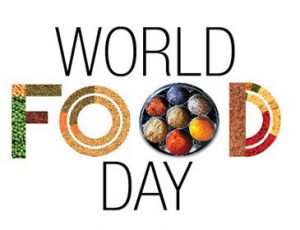 Today, Uganda joins the rest of world to celebrate World Food Day under the theme “Change the future of Migration; Invest in Food Security and Rural Development”. This year’s celebrations will be held in Kachwekano Zonal Agricultural and Development Institute in Kabale district organized by Ministry of Agriculture, Animal Industry and Fisheries in collaboration with the Food and Agricultural Organization of the United Nations.
Today, Uganda joins the rest of world to celebrate World Food Day under the theme “Change the future of Migration; Invest in Food Security and Rural Development”. This year’s celebrations will be held in Kachwekano Zonal Agricultural and Development Institute in Kabale district organized by Ministry of Agriculture, Animal Industry and Fisheries in collaboration with the Food and Agricultural Organization of the United Nations.
This year’s theme is a reflection of the increased phenomena of movement of people both from within the country (internal migration) as seen with rural-urban migration, internally displaced persons and from outside the country (international migrations) characterized by inflow of migrants fleeing their homes due to various reasons. With a total population of 35,035,700 people, the country in the past years has had to battle this growing influx of persons, exacting pressures and causing tensions on finite resources. Internally, the country predominantly remains a rural society with more than 28million residing in rural areas as of 2016. Urban population of Uganda increased from 6 % in 1967 to 16.4 % in 2016 growing at an average annual rate of 2.08 %. On the other hand, Uganda has been ranked as one of the top refugee host countries with high refugee inflow of about 1.3 million refugees from neighboring countries of South Sudan, Democratic Republic of Congo and Burundi.
Notwithstanding the devastating economic, political, social and cultural challenges that have amassed from this phenomenon over time, conditions that have facilitated this inflow and outflow of people within and outside the country is a crucial component in tackling these challenges. For Food Rights Alliance, central among the pull and push factors, specifically regarding rural-urban migration, is the aspect of food security and how availability, accessibility and utilization of food in the rural spaces can lessen people moving from the rural to urban areas. Therefore the understanding of the rural space can’t be divorced from agriculture which has constantly been singled out as the main stay of the economy and which if invested in correctly can have a higher multiplier effect in terms of job creation and food security.
Although changing the future of migration remains a multipronged task, intensifying the investment of adequate extension services and agricultural inputs for rural communities is a step closer to making rural agriculture more attractive. The need for extension services and agricultural inputs in rural Uganda has remained a great demand as well as a challenge to farmers. The country is significantly investing in input distribution consuming a growing percentage of the total sector allocation from 36% in 15/16, 37% in 16/17 and 38% in 17/18 despite the absence of an input distribution system and recorded poor performance and low value from the total investment in inputs which the government through the relevant ministry needs to address.
Regina Kayoyo